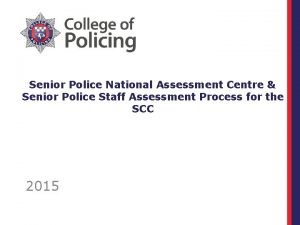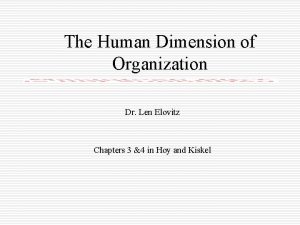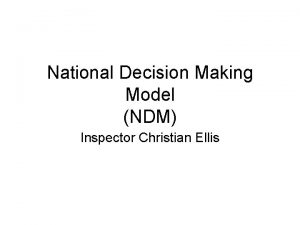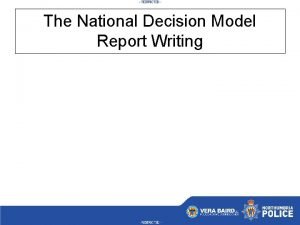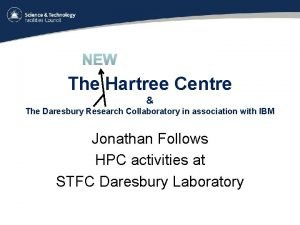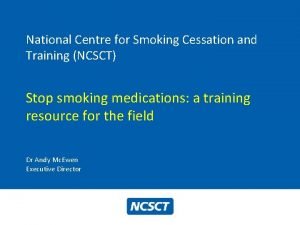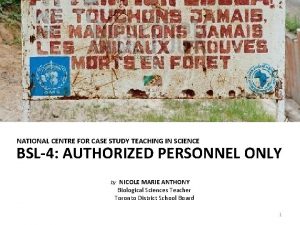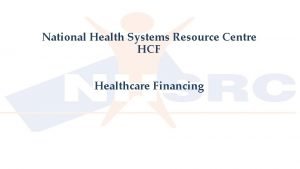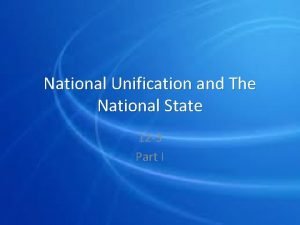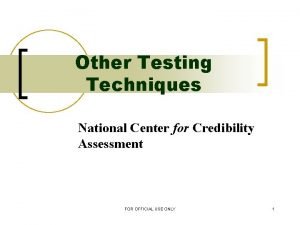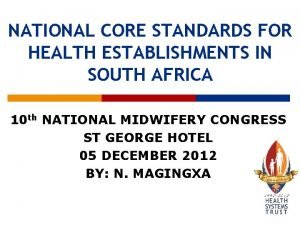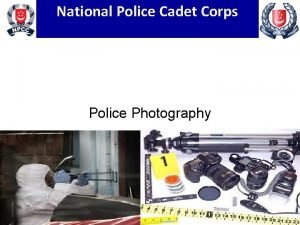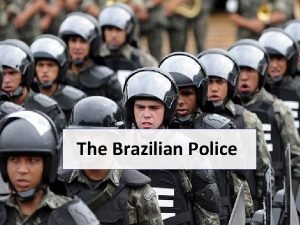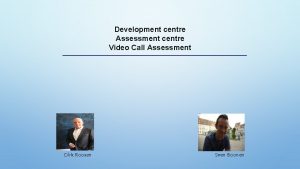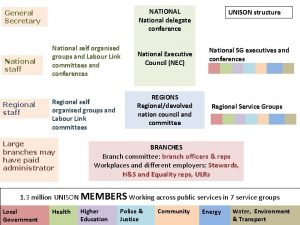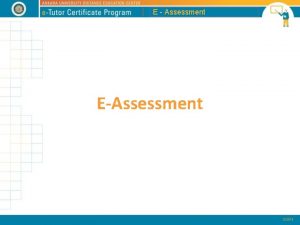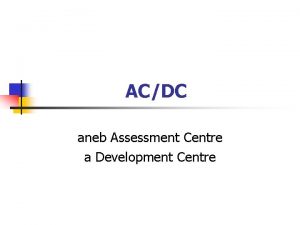Senior Police National Assessment Centre Senior Police Staff






























- Slides: 30

Senior Police National Assessment Centre & Senior Police Staff Assessment Process for the SCC 2015

Introduction The overall intention of this session is to provide prospective candidates with information about the selection process. It will include: - an overview of Senior PNAC/Senior Police Staff - an update on any changes/developments - a discussion on preparation activities - an opportunity to talk through any questions and talk through myths or rumours

Advice for Candidates • Be yourself – don’t try to play a role you think the assessors want you to be • Read the instructions and the task • Be flexible – especially if the exercise is not exactly as expected • Use your experience and behave as you would if you faced this scenario at work • Understand which competencies each exercise assesses • ‘Demonstrating’ not ‘stating’ - In dealing with the exercises you should naturally be demonstrating the competencies, don’t just repeat the definitions • Consider how to spend the time between exercises to ensure best possible preparation

Senior PNAC Aim. . . “To identify those who are capable of being an effective chief officer. ” “This may include highly talented individuals who have some discrete areas for development. ”

Senior Police Staff Assessment Process Aim… “…to identify those senior police staff who are likely to derive substantial benefit from the SCC. ”

Policing Professional Framework: Competencies assessed during the selection process 1. Serving the public 2. Leading strategic change 3. Leading the workforce 4. Managing performance • Assessed at least twice across the exercises at Senior PNAC 5. Professionalism • At Executive Level 6. Decision making 7. Working with others

Assessment Centre Overview • Candidate information letter (approx 4 weeks before the assessment process starts) • • • Ryton from 13 th – 24 th November Three intakes of two/three days for candidates Director, Co-Directors and Associate Director Four/Five candidates in a group Teams of four Assessors - Service Assessors (Senior Police Officers) - External Assessors

Exercise Design Horizon Scanning Stakeholder Consultation Shadowing Chief Officers Initial Exercise Writing Exercise Consultation Pilot Exercise & Marking Guide Writing Exercise Sign-off Training Development

Assessment Centre Exercises 2015 • Management Exercise (2½ hours) • Presentation (50 mins) & Interview (40 mins) • Partnership Exercise (1 hour 10 minutes) • Chief Officer Briefing (2½ hours) • Media Exercise (½ hour) Not completed by Police Staff

Management Exercise • In this exercise candidates are provided with briefing materials which outline a number of tasks which must be completed in a written format. • The pack also contains background information relevant to completing the tasks. • Candidates are required to complete a written response to the exercise on a PC rather than hand write. • The exercise is set within a policing context.

Partnership Exercise • In this exercise candidates are provided with a set of briefing materials and you will have 40 minutes to prepare for a meeting. • Candidates prepare under exam conditions in the same room and start the meeting at the end of the 40 minutes preparation time. The meeting will last 30 minutes. • There will be 3 role actors/assessors in the meeting.

Chief Officer Briefing • In this exercise the candidate is given a briefing pack which contains an operational situation that requires managing within a fictional force. • They are given a number of issues to address and must present their strategy for how they would deal with these issues to the assessor panel. Before the briefing, candidates are required to produce a two page summary of issues and proposals. • The briefing lasts 20 minutes. Following the briefing the assessors have 20 minutes to ask the candidate questions about their briefing.

Media Exercise • Candidates are provided with a briefing information about a policing incident which has become the focus of media attention. • The candidate has 20 mins to review the situation and related materials in order to prepare for a ‘live’ media interview with a journalist. • Candidates will be in the studio for approx 10 mins and will be assessed for the whole time they are in there. • A different media exercise is used at each intake across the Assessment Centre

Presentation & Interview • Candidates will be pre-allocated a topic at random. • Presentation topics are reviewed to ensure they are applicable to candidates from England, Wales, Scotland Northern Ireland. • Candidates have 30 minutes to prepare a presentation to deliver to the assessors. Candidates have 10 minutes to deliver this. Following this, the assessors will have 10 minutes to ask the candidates questions on their presentation. • This will then lead into the interview. The interview will contain a mix of past behavioural and future focussed/hypothetical interview questions.

Priority Areas (Future challenges)-Draft Future challenges facing the Police Service over the next 5 years • • • Maintaining service delivery during on-going austerity. Changing types of crime (e. g. cyber, cross border, population demographics). Internal organisational change needed (e. g. structure, service length, low morale, CPD culture). Need for wider and deeper collaboration (e. g. new partners, mergers). Effective use of new technologies by the Police. Responding to increased scrutiny, accountability, and demands for transparency. Increasing influence of the political environment. Maintaining public confidence. The need to redefine success (e. g. incentive based Govt funding, increased victim focus). Increasing demand beyond just 'cutting crime'.

Priority Areas (Qualities)

Serving The Public Leading Strategic Change Leading The Workforce Managing Performance Professionalism Decision Making Working With Others Draft 2015 Ex by Comp Matrix Chief Officer Briefing Management Exercise Media Exercise Partnership Exercise Presentation and Interview

Serving The Public Leading Strategic Change Leading The Workforce Managing Performance Professionalism Decision Making Working With Others Draft 2015 Ex by Comp Matrix (Staff) Management Exercise Partnership Exercise Presentation and Interview

Assessing Performance: ORCE Model of Assessing Observe Record Objectively Using Evidence Classify Evaluate Supported by Examples of Behaviour

Assessing Performance: Competency Grade Scale A Substantial positive evidence of the competency observed with regard to the quality and quantity of the evidence, and few or no areas for development observed. B Positive evidence of the competency observed and some areas for development but on balance more positive evidence with regard to the quality and quantity of the evidence. C Some positive evidence of the competency observed but on balance more areas for development with regard to the quality and quantity of the evidence. D Substantial areas for development identified and little or no positive evidence of the competency observed with regard to the quality and quantity of the evidence.

Assessing Performance: Exercise Mark Scale 1 Very Effective Task Performance The candidate performed the task very effectively and almost entirely achieved the aims of the exercise. Performance on competencies was exclusively high grades (e. g. mostly As with some Bs). 2 Effective Task Performance The candidate performed the task effectively and mostly achieved the aims of the exercise. Performance on the competencies was mostly high grades (e. g. mostly Bs with some As, possible C). 3 Satisfactory Task Performance The candidate performed the task to a satisfactory standard and met some of the aims of the exercise although some elements were not satisfactory. On balance performance on competencies was more high grades than low grades (e. g. mostly Bs with some Cs). 4 Just Below Satisfactory Task Performance The candidate performed the task to a below-satisfactory standard overall and did not quite meet the aims of the exercise, although there were some areas that were effectively handled. On balance performance on competencies was more low grades than high grades (e. g. mostly Cs with some Bs). 5 Ineffective Task Performance The candidate performed the task largely ineffectively and did not meet the aims of the exercise, although there were some areas that were acceptable. Performance on the competencies was mostly low grades (e. g. mostly Cs and Ds, possible B). 6 Very Ineffective Task Performance The candidate performed the task very ineffectively and did not meet the aims of the exercise, although there may have been some minor areas that were acceptable. Performance on the competencies was exclusively low grades (e. g. mostly Ds with some Cs).

Overall Result – Senior PNAC S* Successful Exceptional, consistently exceeds the level to demonstrate capability to operate effectively at Chief Officer level. S Successful, sufficient demonstration of capability to operate effectively at Chief Officer level. Recommended to attend the Strategic Command Course. UE Unsuccessful on this occasion but encouraged to return in the future having addressed certain developmental needs. UQ Unsuccessful, question of return left open. Candidate may return in the future once they have addressed their developmental needs.

Overall Result – Senior Staff S Successful, sufficient demonstration of capability to derive substantial benefit from the SCC. Recommended to attend the Strategic Command Course. UE Unsuccessful on this occasion but encouraged to return in the future having addressed certain developmental needs. UQ Unsuccessful, question of return left open. Candidate may return in the future once they have addressed their developmental needs.

Personal Feedback • After the assessment all candidates will receive feedback on their performance in the form of written feedback reports. • Written feedback reports will include: • Exercise by Competency Matrix – showing grades and marks • Overall Summary – highlighting strengths and areas for development • Exercise Specific Feedback – write-up, grades and mark

Candidate Preparation • Useful preparation for candidates is to be familiar with the role of a Chief Officer; the competencies in the Policing Professional Framework and how these manifest themselves in practice. • What information do you already have to try to inform these considerations? – Role profile – PDR – Existing PDP – Formal/informal workplace feedback • Candidates need to be fully aware of the competencies being assessed, but do NOT simply regurgitate at the assessment.

Preparation? What sort of tasks would you expect in the exercises? How would you prepare?

Myths & Misinformation • It’s just a hoop you have to jump through • There’s a technique to assessment • Training companies will be able to tell me what to do • Being good at what I do means I’m ready now – candidate should consider whether they are good at the role assessed during the selection process • You just act the part/give them what they want/play the game • Buzz words versus evidence • Success is down to me; being unsuccessful is down to the process

Advice for candidates • Be yourself – don’t try to play a role of who you think the assessors want you to be • Use your experience and behave as you would if you faced this scenario in a workplace • ‘Demonstrating’ not ‘stating’ - In dealing with the exercises you should naturally be demonstrating the competencies, don’t just repeat the definitions • Read the instructions • Be flexible – especially if the exercise is not exactly as expected • Consider how to spend the time between exercises to ensure best possible preparation

SCC 2016 – Module Dates Module/Activity Induction Gold Command for staff and partners PPS Duration 2 days Dates 09/12 – 10/12 07/01 – 08/01 Location Sunningdale 10 days 11/01 – 22/01 Sunningdale Break Business 3 days 6 ½ days 25/01 – 27/01 28/01 – 05/02 Sunningdale Partnerships 5 days 08/02 – 12/02 Scotland Break Leadership and Ethics Tutorials & Graduation 10 days 15/02 – 26/02 29/02 – 11/03 Sunningdale 5 days 14/03 - 18/03 Sunningdale 29

Preparing for SCC Support for SPNAC candidates • Preparing for Executive Leadership Masterclasses (Sept & Oct) • Coaching for underrepresented groups Before SCC • If not already attended Gold PO, Firearms, MAGIC or PIP 4 then attend a Gold PO or Firearms before SCC • Complete all Psychometrics and JI requests including … • Provide preferences for AO course • 25 - 27 January • 17 - 19 February • 24 - 26 February 30
 Police national assessment centre
Police national assessment centre ükala
ükala National staff development council
National staff development council Centroid statics
Centroid statics Difference between centre of mass and centre of gravity
Difference between centre of mass and centre of gravity National action plan for senior citizens
National action plan for senior citizens Philippine national police seal symbol and meaning
Philippine national police seal symbol and meaning National decision making
National decision making National decision model
National decision model Organizational structure pnp
Organizational structure pnp Nslsc rap application
Nslsc rap application Cnesm siv
Cnesm siv National centre for cultural competence
National centre for cultural competence National operations centre
National operations centre National minor illness centre
National minor illness centre National innovation centre for data
National innovation centre for data Hartree national centre for digital innovation
Hartree national centre for digital innovation Iwcims
Iwcims Ncsct training
Ncsct training National center for case study teaching in science
National center for case study teaching in science National centre for statistics and information oman
National centre for statistics and information oman National health systems resource centre
National health systems resource centre Centre national de formation aux métiers de l'eau
Centre national de formation aux métiers de l'eau Tertiary aac assessment centre
Tertiary aac assessment centre Centre for assessment and monitoring
Centre for assessment and monitoring Homecare hertford
Homecare hertford Jlr d grade salary
Jlr d grade salary National unification and the national state
National unification and the national state National youth assessment study
National youth assessment study National center for credibility assessment
National center for credibility assessment 6 priorities of minister of health
6 priorities of minister of health
